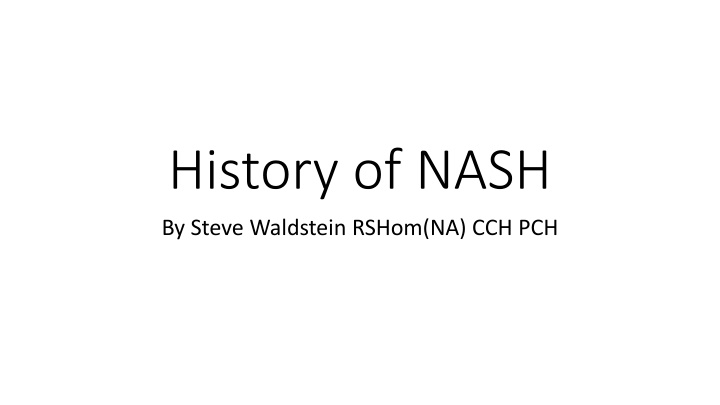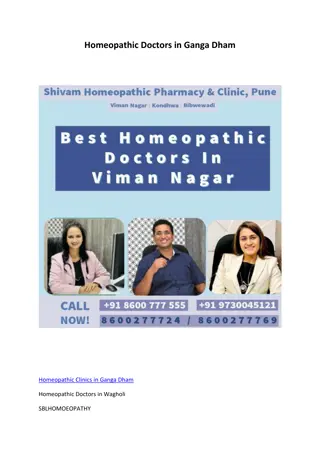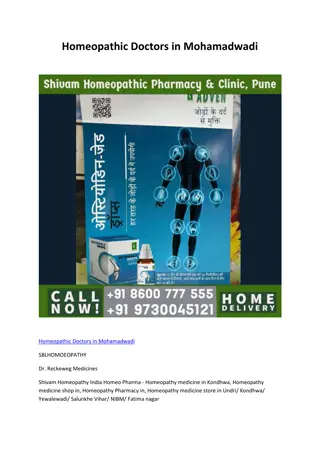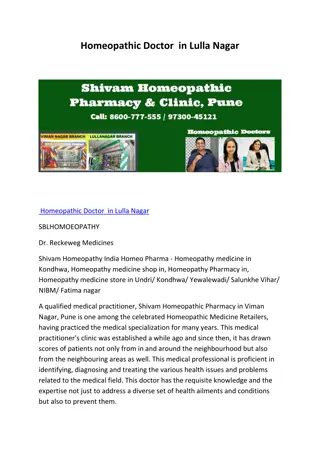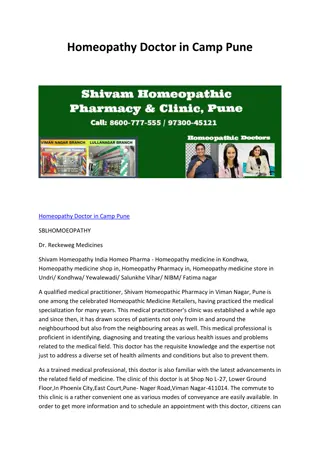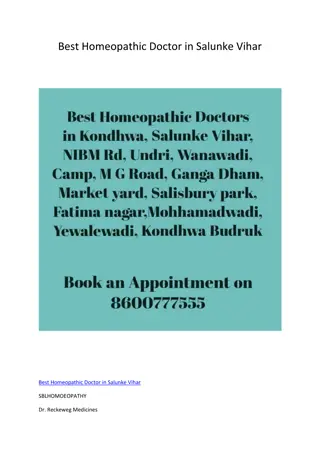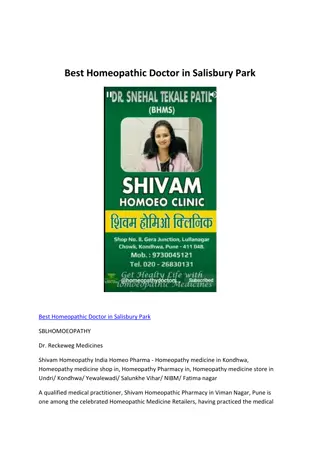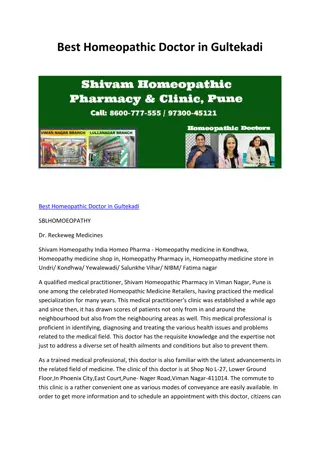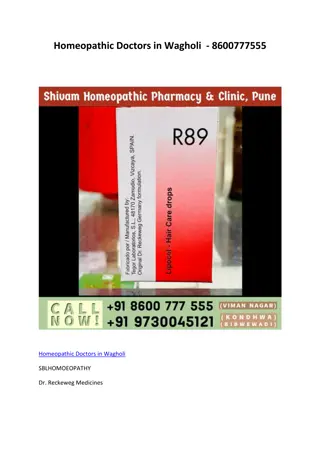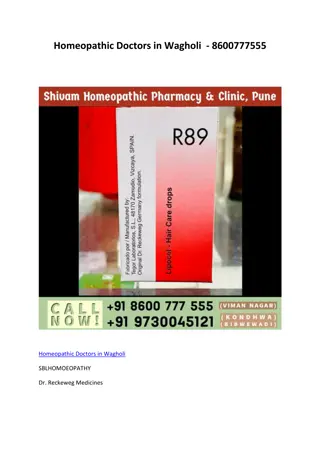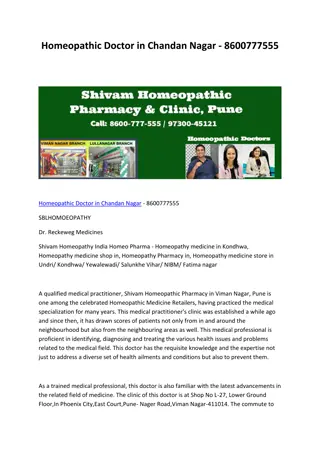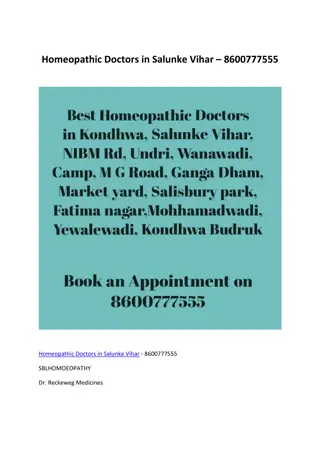History of NASH - Setting Standards and Certification in Homeopathy
NASH, founded in 1990, aimed to set competency standards, certify homeopaths, advocate for legality, and gain recognition in the homeopathic community. They emphasized the ability to solve cases effectively, without requiring an exam. Collaborating with the CHC, NASH worked towards higher standards and a joint certification process.
Download Presentation

Please find below an Image/Link to download the presentation.
The content on the website is provided AS IS for your information and personal use only. It may not be sold, licensed, or shared on other websites without obtaining consent from the author.If you encounter any issues during the download, it is possible that the publisher has removed the file from their server.
You are allowed to download the files provided on this website for personal or commercial use, subject to the condition that they are used lawfully. All files are the property of their respective owners.
The content on the website is provided AS IS for your information and personal use only. It may not be sold, licensed, or shared on other websites without obtaining consent from the author.
E N D
Presentation Transcript
History of NASH By Steve Waldstein RSHom(NA) CCH PCH
NASH Started in 1990 by Lou Klein, Eric Sommer & Val Ohanian Original purposes: Set standards of competency Certify homeopaths Advocate for legality Develop national recognition for homeopathy Gain acceptance for professional homeopaths in the homeopathic community
NASH- Set Standards for Homeopathy We set minimum requirements- including number of hours of instruction- which had to be at one of the good in person schools, and been in practice long enough to have good cured cases to submit. We focused mainly on the ability to take and solve cases We found that many people went to homeopathic schools but could not take a full case or solve the case in a way that showed good grasp of homeopathic principles We did not require an exam
NASH- CHC The CHC Council for Homeopathic Certification started one year after NASH They had a different view on how to test competency. We felt that using their exam was a worthwhile approach to not have to do one ourselves. It also helped address the dual nature of NASH- both a examining board and a professional association protecting the rights of professional homeopaths. While NASH focused on professional homeopaths- not licensed in another medical field- the CHC focused on everyone While NASH had many focuses, of which certification was just one, the CHC s only purpose was certification
NASH CHC Getting Closer From the beginning the CHC and NASH talked a lot, we placed a member on their board of directors and we tried to see how we could work together After years of trust-building we reached an agreement to work together We got the CHC to raise their standards- requiring more cases We got the CHC to grandfather in all RSHom s- giving them all a CHC without taking the exam- this was very difficult to get them to agree to We put our Registrar into a key position at CHC- keeping the standards high
NASH- CHC Relationship Using the CHC to do the certification to our standards fulfilled both the original purposes of Setting Standards for Competency and Certification of Homeopaths In 2001 we completed the agreement for a joint relationship with the CHC.
NASH- Advocate for Legalization Long Term Plans Discussions with attorneys of best ways to approach legalization Decisions to Focus More on Health Freedom Approach Not Licensure Focus on Setting Standards Within the Profession So That the Government Would Stay Away Testify FDA Contributed Money and Energy to Health Freedom Campaigns Established Legal Defense Fund and Aided With Both Money and Advice When RSHom s got into legal trouble for practicing homeopathy
NASH- Develop National Recognition for Homeopathy The least developed of the original goals We tended to leave this more to the NCH
NASH-Gain Acceptance for Professional Homeopaths in the Homeopathic Community Our Most Challenging Goal and Most Successful In 1990 when NASH Started professional homeopaths not allowed to attend most homeopathic seminars, not allowed to any role in NCH, treated as third class citizens By 2003 by NASH refusing to accept this position and insisting on a place at the table- professional homeopaths were fully accepted everywhere- we were a major part of all homeopathic institutions and were no longer made to sit in the back of the bus.
NASH- Presidents 1990- ? ? Eric Sommerman ? -1997 Val Ohanian 1998-2000 Miranda Castro (after 2 years as Exec. Dir) 2000-2003 Steve Waldstein 2004-2004 Sadhna Thakkar 2005-2015 Manfred Mueller 2016- Tanya Kell Lou Klein
NASH- Other Projects Quarterly Newsletters The American Homeopath yearly journal Annual Conferences
NASH- The American Homeopath In 1994- Greg Bedayn asked Lou Klein permission to start a homeopathic journal for NASH He felt the current US homeopathic journals were not at a high enough standard and he proposed an annual high quality journal for strictly classical homeopathy Greg did all the work himself including finding artists to paint paintings for the cover.
Volume 1 1994 Constantine Hering
Vol 2 1995 James Tyler Kent
Vol 3 1996 Melanie Hahnemann
Vol 4 1997 Harris Coulter
NASH- The American Homeopath Named after a journal from 1879 The American Homeopath, which had a motto Hew to the line, let the chips fall where they may. When Greg felt that the community was drifting away from pure homeopathy he wrote an excellent Editorial Titled Hew to the Line calling people back to real homeopathy. Greg died in 2008 at the age of 58. When he got sick he passed on the work to others The journal is now 23 years old- a testament to what Greg and NASH started
NASH Conferences To help build a community of professional homeopaths- at a time when we were not very welcome elsewhere we started an annual conference set to a high standard These were from 1999-2004 when we combined the conference with the NCH
NASH- Annual Conferences New York City Keynotes: Vancouver Keynotes: Lou Klein & Alize Timmerman New York City Keynotes: Jeremy Sherr, Andre Saine & Paul Herscu 1998 1999 2000
NASH- Annual Conferences Copper Mountain, Colorado 2001 Keynotes: Jan Scholten & Mischa Norland Deerfield Beach, Florida 2003 Keynotes: Nandita Shah & Janet Snowden
NASH- Society of Homeopaths UK When NASH was being conceived- the best model seemed to be the Society of Homeopaths in the United Kingdom We informally discussed what they thought of us modeling on them and got positive feedback but I don t think there was any formal agreement Since the Society of Homeopaths gave a RSHom registration- Registed Society of Homeopaths NASH decided on a US+ Canada equivalent of RSHom(NA) All homeopathic organizations in the world know and recognize the RSHom (NA). No countries officially recognize it.
NASH- The Future When I left the helm at NASH our relations with the CHC was excellent, we had met our original goals, but financially we were in bad shape. The new board cut costs by making the quarterly newsletter email only- something we wanted to do but had too much backlash from a minority of members who were not computer savy. The piggybacking on the NCH conference also saved a lot of money. Also eliminating the portraits for the American Homeopath. Financially things improved greatly but the relationships with the rest of the community which we carefully maintained were allowed to decline.
NASH- The Future Now that the CHC has lowered standards and NASH rightfully had to step up and not allow the standards to be lowered the careful balancing act that we did to maintain a united community is being lost. It is important that NASH learn to form bridges to all the other homeopathic organizations- pressuring them to maintain proper standards and build a united future. We need to continue to keep the government from interfering with the practice of homeopathy, something the early NASH Board worried about and took steps to try to avoid.
